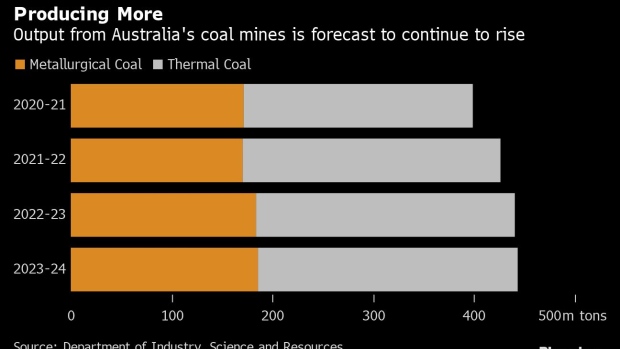Oct 6, 2022
BHP’s Plan to Keep Coal Mine Open for 93 Years ‘Delusional’
, Bloomberg News

(Bloomberg) -- BHP Group Ltd. is seeking approval from Australia’s government to extend the life of a metallurgical coal mine in Queensland for almost a century, drawing the ire of climate groups.
The development application, via a joint venture with Mitsubishi Corp., would ensure the continuation of the Peak Downs Mine “for up to approximately 93 years,” according to a filing published by the Australian government.
The move comes even after Australia’s center-left government vowed to reach net-zero emissions by 2050. The nation’s biggest customers for fossil fuels -- including Japan and South Korea -- have also made similar pledges to dramatically cut their greenhouse gas emissions, while Queensland’s government has promised to close all coal-fired power stations by 2035.
“BHP’s move to extend the Peak Downs coal mine for 93 years to 2116 is delusional,” Harriet Kater, climate lead at the Australasian Centre for Corporate Responsibility, said in a statement Friday. “What part of net zero by 2050 does it not understand?”
The proposed extension would allow mining to continue at the “current production level,” BHP Mitsubishi Alliance, the joint venture that operates the mine, said in a statement. “The world will need reliable long-term supplies of higher quality metallurgical coal for steel-making, to support economic development and to make the infrastructure required for decarbonization,” it said.
Both the Queensland and federal government have continued to back the expansion of coal mining, expected to be the nation’s biggest export earner this financial year. Thirty major coal projects are now awaiting approval from the federal environment minister.
Excluding the Peak Downs extension, coal from those mines would emit around 17 billion tons of carbon dioxide into the atmosphere over their lifetimes, according to recent estimates by activist group Move Beyond Coal. That’s more than half of all global emissions in 2021 and and would use up 4% of the world’s remaining “carbon budget” before atmospheric concentrations of CO2 reach a level where 1.5 C degrees of warming becomes the most likely scenario, the Global Carbon Project has said.
Earlier this year, BHP applied to open a nearby mine, Blackwater South, that could operate for around 90 years. Chief Executive Officer Mike Henry has previously said that application didn’t necessarily mean the project would go ahead, or continue for that period.
BHP has pledged to reach net zero emissions from its operations by 2050. Still, that figure doesn’t include carbon dioxide released when overseas customers burn coal from the company’s mines.
No Alternatives
Metallurgical coal such as that mined at Peak Downs is crucial to the steelmaking process. It’s widely regarded as more acceptable than thermal coal used in electricity generation, because unlike power generation there are no commercially-viable coal-free alternatives for manufacturing steel.
However, green steel technology, which replaces coal with hydrogen in the iron ore reduction process, has been proven to work, albeit on a smaller scale. HYBRIT, a Swedish joint venture of steelmaker SSAB AB, miner LKAB and power company Vattenfall AB, has already produced fossil-free iron pellets, and plans to have a green steel demonstration plant ready by 2026.
German steelmaker Thyssenkrupp AG is working with BP Plc to develop green steel technology, while iron ore miner Rio Tinto Plc is involved with Australia’s Bluescope Steel Ltd. on a similar project.
But BHP has focused on other methods, such as energy efficiency technology and carbon capture and storage, to help customers reduce their emissions, and has said metallurgical coal will be used in steelmaking for decades.
(Updates with response from BHP Mitsubishi Alliance in 5th paragraph.)
©2022 Bloomberg L.P.





